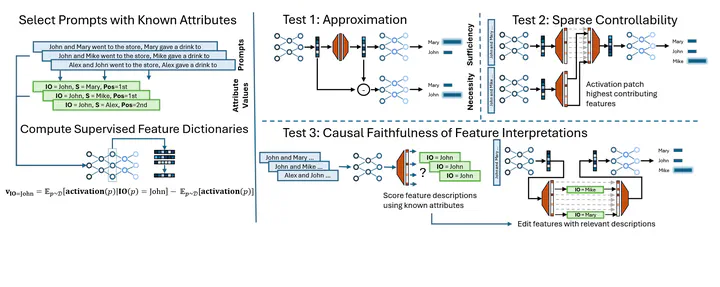Towards principled evaluations of sparse autoencoders for interpretability and control
 Overview of our evaluation pipeline.
Overview of our evaluation pipeline.
Abstract
Disentangling model activations into meaningful features is a central problem in interpretability. However, the lack of ground-truth for these features in realistic scenarios makes the validation of recent approaches, such as sparse dictionary learning, elusive. To overcome this, we propose a framework to evaluate feature dictionaries in the context of specific tasks, by comparing them against \emph{supervised} feature dictionaries. First, we demonstrate that supervised dictionaries achieve excellent approximation, control and interpretability of model computations on the task. Second, we use the supervised dictionaries to develop and contextualize evaluations of unsupervised dictionaries along the same three axes. We apply this framework to the indirect object identification task (IOI) using GPT-2 Small, with sparse autoencoders (SAEs) trained on either the IOI or OpenWebText datasets. We find that these SAEs capture interpretable features for the IOI task, but they are not as successful as supervised features in controlling the model. Finally, we observe two qualitative phenomena in SAE training; feature occlusion (where a causally relevant concept is robustly overshadowed by even slightly higher-magnitude ones in the learned features), and feature over-splitting (where binary features split into many smaller features without clear interpretation). We hope that our framework will be a useful step towards more objective and grounded evaluations of sparse dictionary learning methods.
Type
Publication
In ICLR 2025